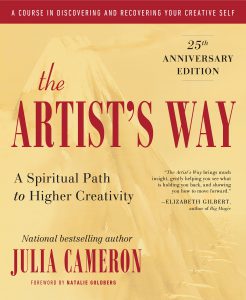
Julia Cameron, author of “The Artist’s Way.” (Photo: Robert Stivers)
You might not consider yourself an artist, but Julia Cameron will convince you otherwise. For over 25 years, Cameron’s “The Artist’s Way: A Course in Discovering and Recovering Your Creative Self” has graced the shelves of countless creators, including SoulTour founder and CEO Tara-Nicholle Nelson and “The 4-Hour Workweek” author Tim Ferriss. The cornerstone of Cameron’s international bestseller is the Morning Pages practice: starting each day with three handwritten pages of stream-of-consciousness thought.
We sat down with Cameron to pick her brain about how innovation can arise from these top-of-the-day ramblings — and why creativity is essential for the conscious leaders who are redefining business as we know it.
Are Morning Pages meant to be artistic?
Julia Cameron: People think they should be artful, but your Morning Pages should be whiny. Write down what’s crossing your mind. They will seem to have nothing to do with creativity, but what they do is clear your head. It’s as though you have taken a Dustbuster to all the corners of your consciousness. It’s useful to think of Morning Pages as a sort of “field report.” The Pages tell us our precise position, our attitudes, and angles. Pages guarantee us a degree of emotional autonomy. We learn to set our own priorities within the agendas of others.
Pages make us far more efficient, as they siphon off negativity and free our minds of extraneous worries. We are able to view our colleagues and ourselves with far more objectivity when we have the Pages as a safe place to vent … also to scheme, plot, and strategize. I often think they should be called Mourning Pages, because they are really a farewell to life as you knew it, and an introduction to life as it’s going to be.

How do Morning Pages factor into being an inspiring, effective, and respectable leader?
JC: Morning Pages give the practitioner the ability to see the big picture. Pages also grant practitioners the ability to sidestep needless drama and to engage in proactive leadership.
What role does creativity play in solving large social and environmental problems?
JC: It takes imagination to strategize for a better future. Creativity suggests stratagems to both undo and redo destructive patterns. Without creativity, we are doomed to continue — and repeat — dangerous protocols.
How can entrepreneurs and startup businesses reframe failure and risk?
JC: I believe in taking inventory: setting on the page in black and white our goals, our wins, and our failures. By looking squarely at what has paid off and what hasn’t, we become better able to strategize for the future. I believe in the power of the pen — writing out our business histories enables us to see clearly those areas that need revamping.




